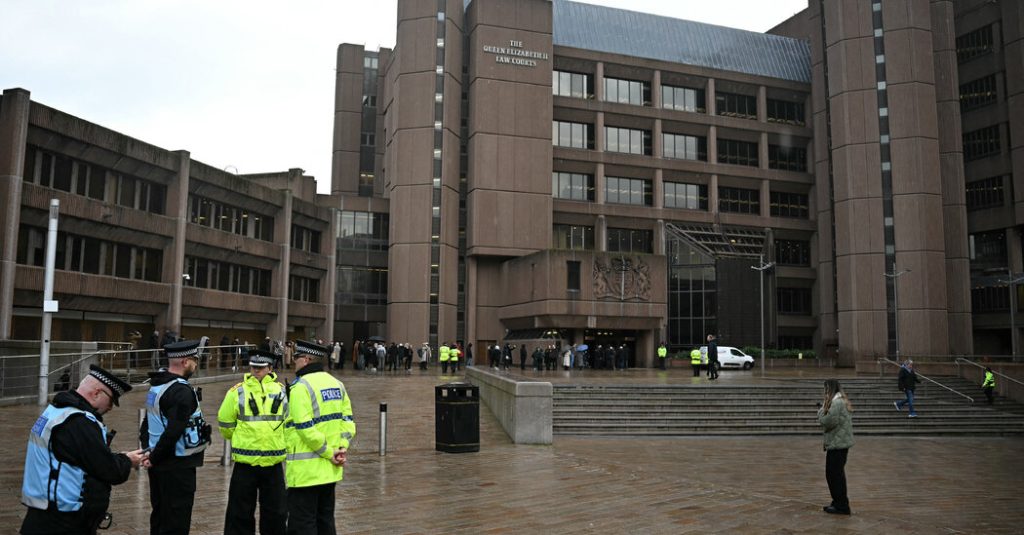Axel Rudakubana, an 18-year-old, faces a life sentence equivalent for a horrific knife attack on a children’s dance class in Southport, England, last summer. The attack left three young girls dead – Bebe King (6), Elsie Dot Stancombe (7), and Alice da Silva Aguiar (9) – and ten others wounded. Rudakubana pleaded guilty to the charges, which include murder, possession of a biological toxin (ricin), and possessing information likely to be useful to a terrorist. His sentencing hearing was marked by outbursts, requiring his removal from the courtroom. The judge emphasized that he alone controlled the proceedings, highlighting Rudakubana’s disruptive behavior which contrasted with his earlier silence when asked to confirm his name.
The attack sparked national outrage and unrest, further fueled by false information circulating on social media, falsely portraying Rudakubana as an undocumented immigrant or asylum seeker. The reality is that he is a British citizen born in Wales to Rwandan parents. Authorities have found no evidence linking him to any specific political or religious ideology. Instead, a picture has emerged of a deeply troubled young man with a long-standing obsession with violence, a history known to local authorities. This history includes three referrals to Prevent, the British counterterrorism program, between the ages of 13 and 14. However, intervention was deemed unnecessary on each occasion as he didn’t meet the threshold for involvement.
Rudakubana’s troubled past includes expulsion from school for bringing a knife and a subsequent attack on a student with a hockey stick, leading to his placement in a school for children with special needs. He struggled to integrate and the isolation imposed by the COVID-19 pandemic further exacerbated his withdrawal from family and community. His preoccupation with violence escalated, culminating in the tragic events of July 29th. The attack at the Hart Space dance studio, where children aged 6 to 11 were participating in a Taylor Swift-themed class, was a brutal act of violence. Rudakubana stabbed multiple children in the crowded room, leading to the immediate deaths of two young girls and the subsequent death of a third after being transported to the hospital. The attack has left eight other children and two adults wounded, both physically and emotionally.
The case has raised serious concerns about missed opportunities to prevent the tragedy. Rudakubana exhibited clear warning signs, including his obsession with violence, his expulsion from school for bringing a knife, and the subsequent attack with a hockey stick. Despite referrals to the Prevent program, no intervention was deemed necessary. This raises questions about the effectiveness of existing systems for identifying and supporting at-risk individuals, particularly young people grappling with violent tendencies. The incident underscores the urgent need for a thorough review of prevention strategies and the threshold for intervention.
The attack highlights the growing concern of young individuals radicalized by online content glorifying violence. Prime Minister Keir Starmer characterized the attack as indicative of evolving terrorism, where young people become radicalized by readily accessible online violence. He highlighted the vulnerability of isolated individuals, often young men, seeking notoriety through acts of extreme violence. This underscores the crucial need to address the proliferation of violent content online and to develop strategies to counter its influence on vulnerable individuals. The ease with which young people can access such content and the perceived anonymity of the online world create a dangerous breeding ground for radicalization.
The discovery of ricin and the Al-Qaeda training manual in Rudakubana’s possession raises further questions about the nature and extent of his radicalization. While no clear link to a specific ideology has been established, the materials suggest an interest in extremist violence. The upcoming public inquiry will hopefully shed light on these issues and identify crucial areas for improvement in preventing similar tragedies. The inquiry must examine not only the specific failures in Rudakubana’s case but also the broader societal factors that contribute to the radicalization of young people. This includes the role of online platforms, the accessibility of extremist material, and the effectiveness of current counter-terrorism and safeguarding measures. The aim is to develop a more comprehensive and preventative approach to tackling this growing threat. The sentencing of Axel Rudakubana marks a critical juncture, offering an opportunity for reflection and action to prevent future tragedies.









